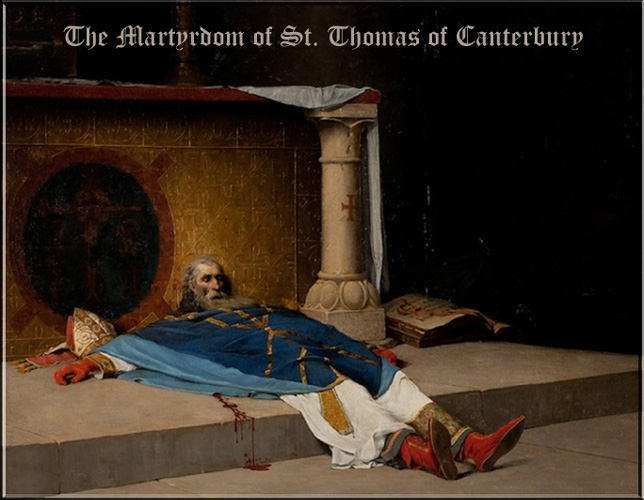 Hymn in Honour of St. Thomas of Canterbury
Dear Saint, whe, as a shepherd true, Did for your flock lay down your life, Where shall we turn, unless to you, To bring us aid amidst the strife? Dear Saint, your torn and wounded head Is laid upon your Master's breast, And death, with all its conflict dread, Is past and lost in endless rest. Dear Saint, the Martyr's crown and palm Are yours, and yours for evermore; Your song, the Saints' triumphant psalm; Your path the heaven's starry floor. Dear Saint, no longer exiled now From your true King and native land; The crimson stains that gem your brow Are wiped away by His own Hand. Dear Saint, the storms of hell in vain Have spent their fury on your head, And our poor land blooms forth again, And pilgrim steps to you are led. Dear Saint, our way in peace protect! And since you hold a burning light, By its sweet ray our way direct. And dissipate the clouds of night. Dear Saint, though men are false and cold, And pass you by without a word; Yet help us, as you did of old; Pray for us to your dearest Lord. Dear Saint, we cannot tell the love That God has given us for you; But when we reach your home above, We'll speak your praise in language true. Dear Saint, yes: in the realms above, In God's great Presence may we meet, Together make our vows of love In Jesus' Heart--at Mary's feet. Amen. ___________________________ St. Thomas, Archbishop of Canterbury by Father Francis Xavier Weninger, 1876
Glorious and celebrated is the great Archbishop, St. Thomas, on account of his fortitude in defending the rights of the Christian Church. He was born at London, in England, of noble, pious and rich parents, who led him early in the path of virtue, and had him carefully instructed in the arts and sciences. Thomas progressed rapidly in both, and gained so high an esteem among both clergy and laity, that Henry II. chose him as Chancellor of the kingdom. He discharged his functions to the entire satisfaction of king and people, until the episcopal See of Canterbury became vacant by the death of Theobald, who had long since ordained Thomas deacon. The king, of his own free will, appointed Thomas as successor to the late archbishop. Thomas refused, for a long time, to obey the king's wish, but at length, recognizing the will of the Almighty, he accepted the high but burthensome dignity.
PRACTICAL CONSIDERATIONS.No sooner had he done this, than he renounced every bodily enjoyment, and in consideration of the grave duties of his station, endeavored so to conduct himself, that his life might shine as a bright example to those under him. Zeal for the honor of God and the salvation of his flock took entire possession of his heart, so that he left nothing undone to further both. The poor and needy enjoyed the greater part of his income, while he used the rest for his own maintenance, being far from delighting in pride or luxury, but devoted to mortifying himself continually. So edifying a mode of life made the new Archbishop agreeable both to God and men. But when he claimed several ecclesiastical benefices, which had been unjustly taken from the church, the usurpers of these estates roused a part of the people against their shepherd, disseminated scandalous reports against him, and endeavored to withdraw from him the love and esteem of the king. At that time, two ecclesiastics had committed grievous faults; and when St. Thomas wished to punish them, some of the courtiers told the king that he, as Lord of the land, should claim the right of judging and punishing as well the clergy as the laity; that he had the power over all, and ought not to permit any encroachment on his rights; and that it was a disgrace to him that the clergy were independent of his power. Not content with this, they persuaded the king to issue laws entirely contrary to the rights and liberties of the church, but approved by the highest nobility of the kingdom, and even by many bishops, whom fear had influenced. St. Thomas boldly resisted these laws, ready rather to die than consent to anything that was against the vow he had made to God and the Church. This lost him the king's favor; and seeing that still greater disturbances might arise if he remained in the country, he secretly left the court, and with two ecclesiastics, went to Rome, related to the Pope what had taken place, and begged him to appoint another Archbishop of Canterbury. The Pope praised his constancy, but would not listen to his request, but advised him to live in retirement, until the king should come to the knowledge of his fault. Hence, the holy archbishop went into the Cistercian monastery of Pontigni, in France, and lived there in great austerity and holiness, until he was informed that the king of England had notified the Abbot of Pontigni that he would destroy every monastery of his Order in England, unless his enemy, Thomas, were dismissed. The holy man then voluntarily left Pontigni in order that his presence might not cause evil to the Order. Louis, king of France, informed of this, came to meet the exiled Archbishop, and took him to another monastery at Sens, which was named after St. Columba. Here he remained until the king of England became reconciled to him. Thus, after seven years, St. Thomas returned to his see, and was received by his flock with inexpressible joy. The Saint discharged his functions as before with great zeal, not in the least complaining of the wrong that had been done to him. But his enemies gave him no peace, they accused him of conspiring against the kingdom and the general welfare of the people, and even of aspiring to the crown. Senseless and plainly false as these accusations were, still they made an impression upon the king, who, in his wrath, said more than once: "Can I have no peace in my kingdom on account of one single priest? Is there no one who will free me from so proud and obstinate a man?" Some of those, who heard these words, supposed that the king would regard them with great favor if they would rid him of the bishop. Hence, they gathered together, went to Canterbury and entered the church, where the holy man was at Vespers. The priests present, when they heard of the arrival of the murderers, would have closed the doors of the church; but St. Thomas would not permit it. "The Church," said he, "is no fort where one prepares for an attack. I am willing to sacrifice my life for the Church of God." During this time, the murderers pressed into the church, and one of them exclaimed on entering: "Where is Thomas, the traitor?" "I am here!" answered the holy man, "but I am no traitor. I am a priest of God, and ready to give my blood for God and His Church. But, in the name of the Almighty, I forbid you to hurt one of my people." He then knelt before the altar and commended himself and his church to God, the Divine Mother, St. Dionysius and other patrons. He had hardly finished his prayer, when the most daring of the murderers gave him so violent a stroke with his sword, that he clove the holy archbishop's head. The others followed and maltreated the Saint so cruelly, that his brains were scattered over the steps leading to the altar, and the pavement before it was covered with blood. After this, they demolished the episcopal palace, and destroyed everything upon which they could lay their hands. The religious and priests, who, in fear and trembling, had endeavored to flee, returned, after the departure of the assassins from the church, called the other ecclesiastics, and with great veneration, interred the body of the murdered Saint. In taking off his clothing, they found a hair-shirt, which the Saint had always worn. This sad and, at the same time, cruel event took place in the year of our Lord, 1170. The king, who, although he had not desired the assassination of the archbishop, had occasioned it by his angry words, did severe and public penance. The murderers were punished by the Almighty. He who had dealt the blow, after long internal suffering, in rage and despair, tore his own body with his teeth, and cut with knives one piece after another from it, until he miserably expired. The other three, who had laid their sacrilegious hands on the holy archbishop, wandered insane and trembling through England, for three years, and at last ended their lives in despair. They were frequently heard to exclaim; "The vengeance, the punishment of God has overtaken us." The tomb of St. Thomas was glorified by many miracles, and all England honored him as a Saint, until the time of Henry VIII, who separating from the Catholic Church, proclaimed himself head of the English church. This king, in a most unprecedented manner, summoned St. Thomas, who had been dead 490 years, to appear in court, and there sentenced him as a convicted traitor. In consequence of this act, his holy relics were exhumed, burned to ashes and then given to the winds. At the same time, a royal command was issued, no longer to call the archbishop holy or to invoke him as a Saint. The real cause of this proceeding was, that St. Thomas had been so fearless a defender of the rights and privileges of the Church of God and of the Apostolic See, upon which Henry VIII. would set his foot, while, at the same time, he laid violent hands on the dead, who had so bravely protected them. So far goes the rage of heresy, regarding neither Christian nor heathen laws; sparing neither the dead nor the living; and not hesitating to dishonor God and His Saints.
Some godless noblemen plotted against St. Thomas of Canterbury, who, as in duty bound, defended the rights of the Church. In our days there are thousands and hundreds of thousands who join secret societies, which in their way labor to overthrow the Church and her rights.
The Holy Fathers call Satan the ape of God. Lucifer had only too well perceived how greatly the assemblies of the Catholics in the catacombs had contributed to the spread of the gospel in the first century, and he has seen in all ages, what help the Church received from her many religious orders, congregations, associations and brotherhoods. Hence his hatred against these institutions. On his side, therefore, he endeavors by means of secret societies and associations, to ruin the foundation of the Church and to overthrow the work of God. That he may have easier play, he seeks to cover the end and aim of these societies under honorable names, such as the rights of man, philanthropy, humanity, enlightenment, advancement, culture, pretending that these associations are only mutual aid societies, founded through pure humanity, and that every Catholic might join them without burdening his conscience. But, dear reader, let not this syren song deceive you. Under the honey of sweet words is hidden the deadly poison. Hear and consider well what I tell you of the wickedness of these associations, which are called secret societies. If you converse with people who endeavor to entice you into their net, they will say: "Why will you not join us, though you are a Catholic? We know one religion only: to believe in God, and be honest, that is sufficient." Answer: "If you do not regard the religion of a man, this in itself is a bad sign which induces me not to join you. I esteem religion and cannot join men to whom it is indifferent." In fact, no Catholic ever joined a secret society, and became thereby better, more zealous or more pious; on the contrary, such persons sink only too soon into entire indifference in regard to matters of faith, and become scoffers. Besides this, how can a Catholic join a secret society? He would be excommunicated and cease to be a Catholic; which means, that the Church would expel him from the community of the faithful and refuse him the Sacraments and Christian burial. How blind are those who think they can belong to secret societies and yet remain Catholics! They ought to be ashamed that they know so little of the consequences of excommunication. But they will say: why does the Church excommunicate secret societies, as they are only associations for mutual aid? Answer: They are apparently mutual aid associations, but in reality, they injure and destroy the root of brotherly love, which says, without making any distinction: "Thou shalt love thy neighbor as thyself," hence, also, aid him as thyself. And though it is impossible for us to practice this commandment literally in regard to all men on earth, yet we must observe it in favor of those with whom we come in contact, on principles very different from those on which secret societies are based. An example will make this clear. Travelling on the Pacific ocean, I met on board of a steamer the agent of an American lodge of free-masons, with whom was his wife, who was an excellent Catholic. I said to this agent: "Dear Sir, would it not be far better for you to learn what the Church teaches and become a Catholic?" He replied: "The Church would not accept me." "I know the reason," said I, smiling, "you are a mason." "I am," answered he, "and everybody ought to be one; masonry is pure brotherly love." "On the contrary," said I, "the principles of masonry wound true charity in its very root. I will prove it to you immediately. Listen to that man near us, what abominable language he uses!" "I think him," he said, "a very bad fellow." "Suppose now," I continued, "that I should fall overboard, and that fellow too, and that you had only one rope, to whom would you throw that rope in order to save him?" "Of course to you, father." "But he makes a sign to you that he is a mason, and should another mason stand by your side what would he say? would he not say: 'that is a mason, pull him out and let the priest be drowned.' Is that right?" Secondly: to take an oath of secrecy for something that one does not know, cannot be done by an honest man. An honest man will say: "No, I do not promise silence, unless your secret is something good; if it is bad, I will not conceal it, but do my duty. And to bind myself to fulfil blindly any order that may be given, is repugnant to my sense of freedom. I do not wish to make myself a slave." "Well, if you speak thus, we will not aid you." Answer: "Then God will aid me; I trust more in Him than in you." Oh! how many a mason has said: "Had I trusted more in God than in men, than in this society, I should not have been visited by misfortune." Lastly, "by their fruits shall ye know them," says Christ. Masons, and their affiliated societies, may say a hundred times that they do not trouble themselves about church and religion; yet all the outrages which are done to the Church in our days are only the consequence; of the labors of the secret societies, whose grand-masters are the princes of the earth and their counsellors. It is true that the brothers of the lower grades suspect and know but little of all this; they are used only as tools. Besides, a Catholic must believe that the Church, inspired and guided by the Holy Ghost, has reasons for condemning such societies and that she would not be so strongly opposed to them, if they were not so dangerous to the salvation of souls. The Church is our mother and we are bound to obey her voice; we cannot fail in this, without paying dearly for our folly. A solicitous mother not only sees that her child, when wounded, is healed, but also takes care to keep it out of danger. Father of a family! would you suffer your children to hold secret assemblies in your house during the night and not permit you to know what they do? In the same manner and by the same right, the Church, our Mother, acts in not permitting her children to join societies, with whose workings, not even the confessor can be made acquainted. ___________________________ The Seven Joys of Our Blessed Lady in Heaven
This devotion, no less than the former, is pleasing and agreeable to the ever-glorious Mother of God. She herself teaches us this truth; she suggested and recommended the practice of it to her servant, St. Thomas, archbishop of Canterbury, as is related by Pelbartus in his Stellarium, and in his sermon on St. Thomas; and also by Ballingham, in his Calendar of the Blessed Virgin. St. Thomas, whilst reciting the Hail Mary seven times, which he daily did in memory of the principal joys his blessed Patroness, the ever-glorious Virgin, received whilst upon earth, was favored with an apparition of the Queen of Heaven. She exhorted him to add seven Aves more each day in honor of the seven signal joys she possesses in heaven, and to instill the same devotion into the minds of others; assuring him that this instance of their respect and affection should not pass without her peculiar regard and recompense; that in their afflictions she would assist them, and that she would comfort and support them, especially at the hour of their death.
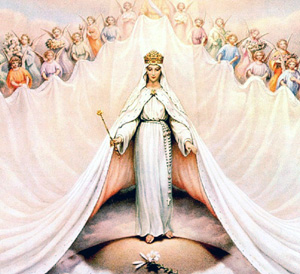
She is Exalted Above All the Choirs of Heaven
Rejoice, O most glorious Virgin! thy profound humility and purity without example have raised thee above all the Angels, and the celestial hierarchy: thy glory, O Virgin Mother! as far surpasses that of all the Saints in heaven, as thy sanctity was superior to theirs upon earth. I rejoice in thy exaltation, O blessed Mother of God ! Look down on thy servant, and by thy power and goodness obtain for me, from thy Son, a meek and pure heart, that I may serve thee faithfully in this life, and by thy intercession, be happy with thee hereafter. Amen. Hail Mary.
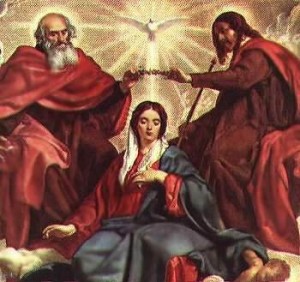
Her Presence Adds a Luster to Heaven
Rejoice, O most glorious Virgin! such is the light of thy glorified body, that it illuminates the heavenly Jerusalem, even as the sun enlightens this lower hemisphere: thy presence not only adds an accidental beauty to that heavenly city, but also increases the happiness of each inhabitant of that blessed court. I rejoice in thy excellence, O blessed Mother of God ! Look down on thy servant, and by thy power and goodness, obtain for me, from thy Son, a meek and pure heart, that I may serve thee in this life, and by thy intercession, be happy with thee hereafter. Amen. Hail Mary.
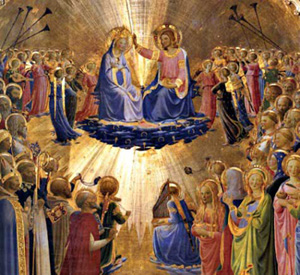
She is Singularly Honored by All the Blessed
Rejoice, O most glorious Virgin! the Saints and Angels in heaven honor thee as the daughter of God the Father, mother of God the Son, and spouse of God the Holy Ghost. They pay all due respect, love and homage to thee, the object, next to God, of their complaisance, gratitude and affection. I rejoice in the honors paid to thee, O blessed Mother of God ! Look down on thy servant, and by thy power and goodness, obtain for me, from thy 6ok, A meek and pure heart, that I may serve thee in this life, and by thy intercession, be happy with thee hereafter. Amen. Hail Mary.
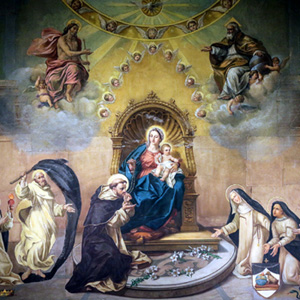
Her Intercession in Favor of Her Servants is All-Powerful
Rejoice, O most glorious Virgin! such is thy favor with God, that when thou art pleased to interpose in behalf of the sinner, there is no danger of a refusal on the part of heaven. I rejoice in thy power, O glorious Mother of God ! Look down on thy servant, and by thy power and goodness, obtain for me, from thy Son, a meek and pure heart, that I may serve thee in this life, and by thy intercession, be happy with thee hereafter. Amen. Hail Mary.
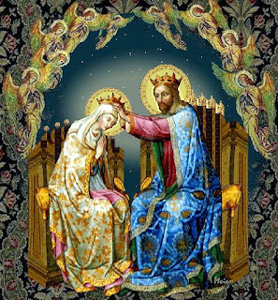
Her Throne is Next to that of Her Divine Son
Rejoice, O most glorious Virgin! my soul is incapable of containing the transports it feels. May the adorable Trinity, Father, Son, and Holy Ghost, be ever blessed, who has distinguished thy throne in so glorious a manner, and has fixed thy seat next to that of thy divine Son. I rejoice, and my joy is above all I can express, in thy glory, O glorious Mother of God ! Look down on thy servant, and by thy power and goodness, obtain for me, from thy Son, a meek and pure heart, that I may serve thee in this life, and by thy intercession, be happy with thee hereafter. Amen. Hail Mary.
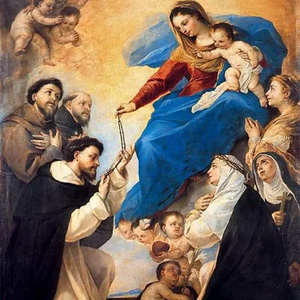
God Regards and Loves those who Love and Reverence the Blessed Virgin
Those who love and reverence thee. Great is then portion, happy their lot in particular, who with zeal and affection promote thy honor and thy glory. I rejoice in the favor thou enjoyest, O glorious Mother of God ! Look down on thy servant, and by thy power and goodness, obtain for me, from thy Son, a meek and pure heart, that I may serve thee in this life, and by thy intercession, be happy with thee hereafter. Amen Hail Mary.
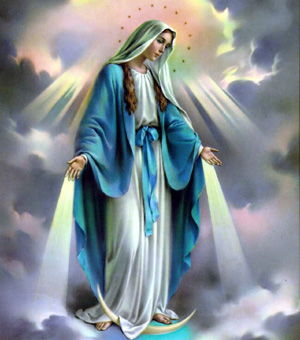
Her Joy and Glory are Eternal
Rejoice, O most glorious Virgin! thy essential bliss and happiness, how immense soever, will never have an end or diminution, and thy joy will, through all ages, be augmented. I rejoice in thy felicity, O glorious Mother of God! Look down on thy servant, and by thy power and goodness, obtain for me, from thy Son, a meek and pure heart, that I may serve thee in this life, and by thy intercession, be happy with thee hereafter. Amen. Hail Mary.
Litany of Intercession for England
Remember not. O Lord, our offenses,
nor those of our parents: neither take
thou vengeance of our sins.
Lord have mercy. Lord have mercy. Christ have mercy. Christ have mercy. Lord have mercy. Lord have mercy. Jesus, receive our prayers. Lord Jesus, receive our petitions. God the Father, Creator of the world, Have Mercy on us. God the Son, Redeemer of mankind, Have Mercy on us. God the Holy Ghost, Perfecter of the elect, Have Mercy on us. Sacred Trinity, three Persons and one God, Have Mercy on us. Holy Mary, Mother of God, Pray for England. * Holy Mary, Queen of Angels, who alone destroyest all heresies, * Holy Mary, Virgin of virgins, whose eminent sanctity our Lord hath honoured with so many miracles, * St. Michael, prince of the Church, * St. Gabriel, glorious messenger of our Saviour's Incarnation, * St. Raphael, faithful guide of those who have lost their way, * Holy Angel, to whose pious custody this province is committed, * All ye holy Angels and blessed Spirits of heaven, who celebrate with joy the conversion of sinners, * St. John Baptist, precursor of the Messias, and great example of penance, * All ye holy Patriarchs and Prophets, friends of God, and advancers of His truth, * St. Peter, prince of the Apostles, and supreme pastor of Christ's sheep, * St. Paul, doctor of the Gentiles, who, of a persecutor, becamest a preacher, * St. Andrew, first disciple of Christ, and constant lover of the cross, * All ye holy Apostles and Evangelists, chief planners of the Christian faith, and zealous maintainers of Catholic unity, * St. George, our principal patron, * St. Alban, our first martyr, * St. Thomas of Canterbury, who, as a faithful shepherd, laidst down thy life in defense of the Church, * All ye holy Martyrs of this nation, who voluntarily lost your lives here to find them in a joyful eternity, * St. Gregory, most vigilant Bishop of the Universal Church, whose pious zeal sent missioners from Rome for the conversion of our ancestors, * St. Auguslin, Apostle of this nation, by whom our forefathers were reclaimed from paganism and infidelity, * St. Bede, most venerable Confessor, by whose religious life and learned writings the Catholic faith was eminently propagated amongst us, * All ye holy Bishops and Confessors, by whose wisdom and sanctity this island was once a flourishing seminary of religion, * St. Helen, most holy queen, and mother of the first Christian emperor, * St. Ursula, most blessed martyr, who died in the a glorious defense of faith and chastity, * St. Winefride, most admirable virgin, even in this unbelieving generation still miraculous, * All ye holy Saints of this nation, who, amidst the innumerable joys of heaven, still retain a particular charity for the salvation of your country, * All ye holy Saints of all places who, though divided here in several regions, were united in the same faith, and now enjoy one common felicity, * Be merciful, Spare us, O Lord. Be merciful, to Graciously hear us, O Lord. From the dangers most justly threatening our sins, Deliver England, O Lord. ** From the spirit of pride, rebellion, and apostacy, ** From the spirit of hypocrisy, profaneness, and sacrilege, ** From the presumption of private opinion, and contempt of the authority of thy Church, ** From schism, heresy, and all blindness of heart, ** From gluttony, drunkenness, and the false liberty of an undisciplined life, ** We sinners, Beseech thee, hear us. That it may please thee to hasten the conversion of this our miserable country, and reunite it to the ancient faith and communion of thy Church, We beseech thee, hear us. *** That it may please thee particularly to have mercy on our relations, friends, and benefactors, and open their eyes to see the beauty of thy truth, and embrace it, *** That it may please thee to comfort and strengthen thy servants, who suffer for the Catholic faith, *** That it may please thee not to permit the weakest of us by any temptation whatsoever, to fall away from thee and thy truth, *** That it may please thee to assist with thy special grace those good pastors who venture their lives for their flock, *** That it may please thee daily to augment in them the fire of thy love and the zeal of gaining souls, *** That it may please thee to preserve the Catholics of this land from all sin and scandal, *** That it may please thee so to adorn their lives with solid piety, that others, seeing their good works, may glorify thee our heavenly Father, *** That it may please thee to enlighten the hearts of all schismatics with thy powerful grace, *** That it may please thee to shew them the danger of their state, and the great importance of eternal salvation, *** That it may please thee mercifully to look down from heaven on the tears of the afflicted, and the blood of so many martyrs, who have spent their lives, and suffered death, to convert us to thee, *** Son of God, *** Lamb of God, who takest away the sins of the world, Spare us, O Lord. Lamb of God, who takest away the sins of the world, Graciously hear us, O Lord. Lamb of God, who takest away the sins of the world, Have mercy on us. Christ hear us. Christ graciously hear us. Let us pray. The Church and England
Honour the Agony and Death of Jesus Christ, and the interior and exterior sufferings which He endured from the age of twenty-five to thirty years, especially at the thought of the persons of that age, who abandon themselves without restraint to their disordered passions.
Agonizing Heart of Jesus, have mercy on us.In union with these sufferings, offer your works, your pains, your sufferings, and the sacrifice of your life for the triumph of the Catholic religion in England, Ireland, and Scotland, particularly for those who govern in these countries and elsewhere. Ask of God, if such be His good pleasure, that you may suffer for these intentions. Compassionate Heart of Mary, pray for us. Saint Michael, Archangel, pray for us. Saint Joseph, pray for us. Holy Apostles and Martyrs, pray for us. Holy Guardian Angels of England, Ireland, and Scotland, pray for us. Saints who sanctified yourselves in these three kingdoms, pray for us. ON THE GOSPEL OF THE GOOD SHEPHERD, JOHN x., (Read on the Feast of ST. THOMAS OF CANTERBURY) by Richard Challoner, 1807
Consider first, that the Son of God, by His incarnation and birth, did not only come amongst us to be our Father and to be our head--our king, our priest, and our sacrifice; our bother and our friend our physician and our advocate:--but also recommends Himself to us in this gospel under the amiable quality of the good shepherd and pastor of our souls. 'I am the good shepherd,' saith He, verse 11: 'the good shepherd giveth his life for his sheep. But the hireling, and he that is not the shepherd, who is not the owner of the sheep, seeth the wolf coming, and leaveth the sheep, and runneth away, and the wolf catcheth and scattereth the sheep: but the hireling runneth away, because he is a hireling; and he hath no concern for the sheep. I am the good shepherd; and I know Mine, and mine know Me. As the Father knoweth Me, and I know the Father; and I lay down my life for My sheep,' &c. O, Christians, how happy are we in such a shepherd--so good, so loving, so careful of our true welfare! O He is the good shepherd indeed, that came down form heaven to seek the poor sheep that was lost, and when He had found it took it upon His own shoulders, to carry it home with joy to His heavenly fold, Luke xv. O how dearly have His sheep cost Him! O how truly has He made good in Himself that sentence, that 'the good shepherd giveth his life for his sheep!' O let us ever embrace and love, follow and obey this true Shepherd of our souls!
http://catholicharboroffaithandmorals.com/Consider 2ndly, in how many ways this heavenly Shepherd is daily providing for all the necessities of His sheep, and the tender affection He perpetually shows them. 'The Lord ruleth me,' (or as it is in the original, is my shepherd,) saith the Psalmist, Ps xxi., 'and I shall want nothing: He hath set me in a place of pasture.' Yes, Christians, He has placed our souls here in the midst of rich pastures of His divine word and sacraments, in the communion of His church. He hath brought us up by the streams of the living waters of His grace, which are ever flowing to refresh and nourish us. He conducts us to the paths of justice, He converts our souls, He is with us even when we are walking in the midst of the shadow of death; His rod and His staff still comfort and support us. But O give ear, my soul, to what follows in the same Psalm: 'Thou hast prepared a table before me against them that afflict me. Thou hast anointed my head with oil, and thy chalice, which inebriated me, how goodly is it!' Here are benefits indeed of this divine Pastor of our souls: He has prepared a table for us, in which He feeds His sheep with His own most sacred body and blood; He anoints our heads with the divine oil of His holy Spirit, and He inebriates us with the goodly chalice of His passion, continually offered up on our altars, to be a plentiful source to us of all heavenly grace. and in consequence of all these favours already bestowed on us He encourages us to conclude with the royal prophet, 'that His mercy will follow us all the days of our life, and that we shall dwell in the house of the Lord unto length of days even to a happy eternity.' Consider 3rdly, what we owe, in quality of the sheep of Christ, to this divine shepherd. He tells us, John x. 3, 4, 5, 'That His sheep hear the voice of their shepherd; that He calleth His own sheep by name and leadeth them out; that He goeth before them; and that the sheep follow Him, because they know His voice; but a stranger they follow not, but fly from Him, because they know not the voice of strangers.' And again, verses 27, 28, 'My sheep hear My voice; and I know them; and they follow Me, and I give them eternal life; and they shall not perish for ever; and no man shall snatch them out of My hand.' Christians, do we keep close to this heavenly shepherd? Do we follow Him both by our faith, and by our life? Do we know Him and hear His voice? Do we fly from strangers, the world, the flesh, and the devil? If so, we are His sheep indeed; and if we persevere, He will bring us in spite of the world, the flesh, and the devil, to the pastures of eternal life. But if we run away from our Shepherd, to follow these strangers, we must expect to fall a prey to the wolves. Conclude to embrace your divine Saviour, under this amiable character of the pastor and shepherd of your souls; and as nothing has been wanting on His side to fulfil, to the utmost perfection, even beyond all expression and imagination, every part of the character of the good shepherd; see nothing be wanting on your side to fulfil, by a perpetual correspondence with His grace, every part of the character of good sheep. |